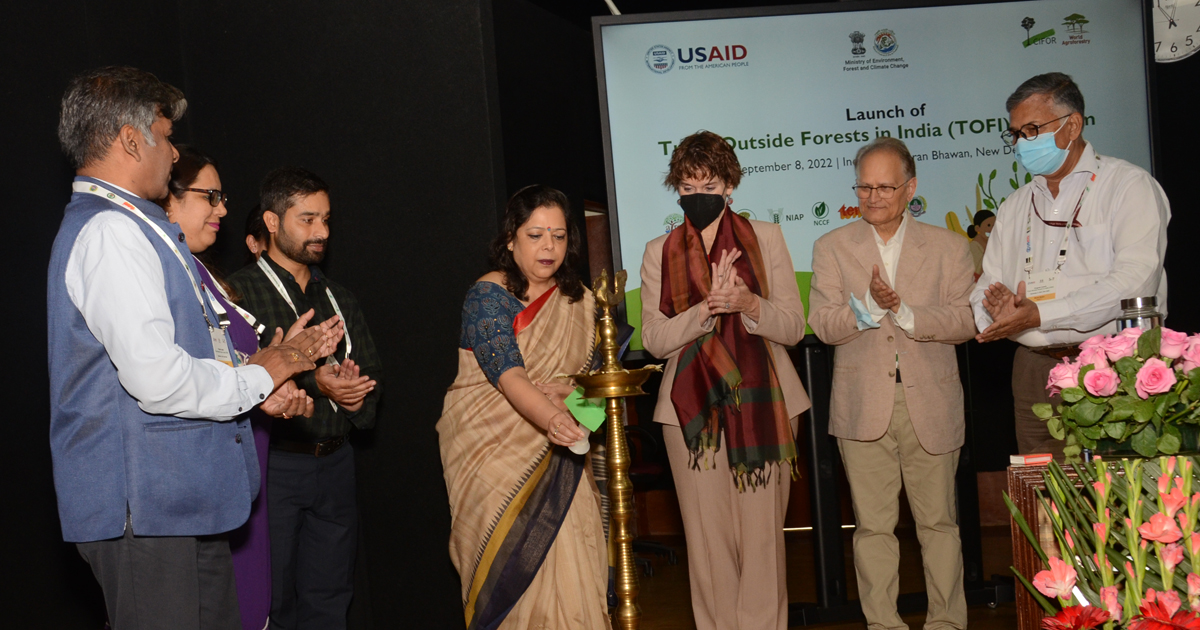
USAID and Indian Government collaborate to increase tree coverage for climate action in India
It is often said that the best time to act against climate change was yesterday; the next best time is today. In a bid to support global climate change mitigation and adaptation goals, the US Agency for International Development (USAID) and the Indian government’s Ministry of Environment, Forest and Climate Change (MoEFCC) launched a new program, ‘Trees Outside Forests in India (TOFI)’, on September 8, 2022.
Led by the Center for International Forestry Research (CIFOR) and World Agroforestry (ICRAF), the five-year program seeks to scale up trees outside forests in India to enhance carbon sequestration, increase tree-based livelihoods, and build climate-resilient agriculture.
In recent times, the Indian government has given huge impetus to the expansion of trees outside forests through policies and schemes that incentivize and support farmers and other stakeholders to take up trees outside forests (TOF) systems, particularly agroforestry.
“India is completely committed to agroforestry,” said Leena Nandan – MoEFCC’s secretary – in her address at the launch. “It is center-stage in our planning. I hope the intervention and collaboration on trees outside forests will lead to a very successful outcome in terms of giving a visible boost to agroforestry and fostering an increase in green cover and the economic activities centered around it – including the commercial production of trees.”
“Trees can help achieve the ‘triple-win’ situation – providing livelihoods, absorbing planet-warming greenhouse gas emissions, and improving the health of the ecosystems,” said Chandrashekar Biradar, TOFI’s Chief of Party and India’s Country Director for CIFOR-ICRAF. “By bringing lost trees into mainstream agriculture and man-made landscapes, TOFI will play a vital role in meeting India’s national climate goals and international commitments.”
Such targets include the country’s Nationally Determined Contributions to the Paris Agreement on Climate Change (NDCs), the Bonn Challenge, Land Degradation Neutrality, and the Sustainable Development Goals (SDGs). Growing trees outside forests can also support food and livelihood security for rural Indians, especially for poor and vulnerable groups.
However, there are various economic, policy, capacity, and information-related barriers to realizing the full potential of trees outside forests in the country. The TOFI program aims to address these barriers by:
- Strengthening the enabling environment to improve laws, regulations, policies, certifications, and standards to scale up trees outside forests
- Enhancing access to finance, insurance, and quality planting material, and providing incentives and value-chain support to boost demand for products from trees outside forests
- Bridging gaps in technical and market information through extension services, knowledge, data, monitoring, and decision tools
TOFI seeks to approach climate change through the lens of multi-stakeholder engagement in tree planting for its numerous benefits. These benefits include carbon capture, improved soil health for increased productivity and income, and subsequent improvement in livelihoods. “The TOFI program will improve individual lives through increased economic opportunities and crop yields, as well as contribute to our global priorities of addressing climate change through sustainable solutions,” said Veena Reddy, Mission Director for USAID India. “We hope this will provide a model that can be scaled and replicated in India and beyond.”
The project will be implemented in the states of Andhra Pradesh, Assam, Haryana, Odisha, Rajasthan, Tamil Nadu, and Uttar Pradesh. TOFI will be implemented through key partners, including Ashoka Trust for Research in Ecology and the Environment (ATREE); Central Agroforestry Research Institute (CAFRI); Gramin Vikas Vigyan Samiti (GRAVIS); National Institute of Agricultural Economics and Policy Research (NIAP); Network for Certification and Conservation of Forests (NCCF); The Energy and Resources Institute (TERI); Tropical Forest Research Institute (TFRI); and the Forest College and Research Institute of Tamil Nadu Agricultural University.
By expanding trees beyond forests, TOFI will contribute to putting 2.8 million hectares of new land into trees outside forests across the seven project states – thus capturing 420 million tons of carbon dioxide equivalent. Also, by contributing to other ecosystem services such as the availability of raw materials for industries, safe drinking water, clean air, erosion prevention, and nutrient cycling, the program will impact positively on at least 13.1 million people across the country.













